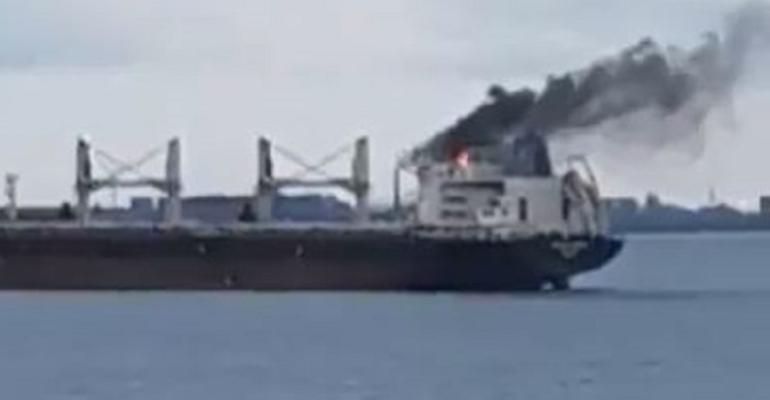As they headed into the Black Sea, to load export cargoes of grain, coal or fertilisers, it would have been business as usual, their Masters perhaps warned to beware of unusually high naval activity as they approached the Crimean coast. Anchored off awaiting a berth, with their deck lights burning brightly, nobody would have anticipated that any of these ships, flying flags that would have been unlikely to attract any attention, could have been the target of any hostile act, let alone a missile strike into the accommodation.
It doesn’t take a great deal of hindsight to suggest that there had been no shortage of warnings about Russia’s invasion of Ukraine, despite Moscow’s regular denials. But the charters had been inked, and for better or for worse, more than 80 merchant ships headed for what has now become a “Warlike Operations Area”, their owners hoping for the best and that it would all blow over.
Business is business, of course, but one might have thought that there had been plenty of warnings about the likelihood of hostilities. Do ship operators not read newspapers or listen to what was being broadcast? They are wiser now, with some half a dozen ships attacked, at least one sunk by a mine, and efforts now being made to extricate their crews. There have been deaths and injuries and as the situation on the Black Sea coast and Sea of Azov become ever more dangerous, it could well be that many of these effectively abandoned ships will be lost. There are historical parallels with that “ghost fleet” of ships that were abandoned when war broke out between Iran and Iraq, subsequently to be looted and wrecked.
Seafarers have always represented collateral damage in war, just as they have been during the pandemic, as the ships keep on trading regardless. The poor Third Engineer killed on the bulker Banglar Samriddhi, is just one small statistic in the tragedy of this conflict, but he was as innocent as any of the non-combatants who are dying ashore. He was just doing his job, keeping the arteries of international trade flowing, although it is not a daft question to ask what his ship was doing in such a dangerous place.
The lives of seafarers have too often been seen as secondary when a lucrative piece of business is there to be negotiated. Who remembers the aforesaid Iran-Iraq conflict, that we later called the “tanker war”, with these huge vessels used as target practice by the heroic aviators of both warring nations? There were fortunes made by owners willing to risk their undefended ships in the hazardous Gulf waters, although few of the riches would have trickled down to the crews. Some, it was said at the time, were wholly ignorant of their ship’s destination, until the Exocets started flying around.
Some 400 international seafarers died in these attacks which lasted throughout the conflict between the gulf states. The tankers kept sailing and the oil kept flowing, although few of those filling up their cars on the garage forecourt would have made any connection between the fuel price and the blood of dead and injured seafarers.
Now with Russia heavily sanctioned and increasingly seen as a pariah state, it will not be remotely surprising to hear of tempting business opportunities involving voyages to Russian ports, or movements of sanctioned cargo. Business is business, although such is the assistance of technical transparency that it is harder to hide such transactions than it was in the past.
But in considering the collateral damage, it is worth sparing a thought for the considerable number of Ukrainian and Russian seafarers whose lives will have been turned upside down by this horrible conflict. With a reputation as excellent officers and spread around the international fleet, their situation, coming after more than two years of pandemic misery, is altogether unenviable.
Copyright © 2024. All rights reserved. Seatrade, a trading name of Informa Markets (UK) Limited.
Add Seatrade Maritime News to your Google News feed.  |

